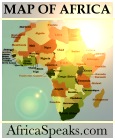DR Congo: victims of the power
Posted: Sunday, March 19, 2006March 18, 2006, socialistworker.co.uk
Imperialism is to blame for the Democratic Republic of Congo's torment, writes Jules-Cesar Malula
Unhappy the nation whose death rates are featured only in the Lancet! This British medical journal has become famous recently for suggesting that 100,000 civilians died after the US/British invasion of Iraq, and then that four million people have died in the Democratic Republic of the Congo (DRC) since 1998.
Normal countries have large scale deaths reported in their press, or they are debated in parliament. In Iraq and the DRC nobody counts.
I want to understand why DRC has undergone such torment. Other studies suggest that four million is an under-estimate and that ten million have died in the DRC since civil war began in 1996.
The DRC is a central African country two thirds the size of Western Europe, with a population of 50 million. It has been torn apart by six invading African armies and dozens of local militias. All of these forces have at various times been backed by rapacious multinationals.
But the real actors are the great powers. The US, Belgium, Britain and France in particular have manipulated the conflicts, supplied millions of dollars of arms, aided particular governments and either held back or pushed on the United Nations (UN) forces to suit a particular agenda.
This is clear to anyone who seriously examines the situation. At the end of last year the International Court of Justice ruled that Uganda must pay up to $10 billion compensation to the DRC for looting during 1998-2003.
The court also found Uganda responsible for human rights abuses.
Yoweri Museveni's regime in Uganda is undoubtedly culpable, but the West backed Museveni as one of a "new breed" of African leaders.
Both Rwanda and Uganda are heavily dependent on Western aid – around half of Uganda's national budget comes from European Union (EU) countries. Uganda is useful for US imperialism in this region. The US has a permanent military base in northern Uganda, from which it chases "Al Qaida terrorists".
The illegal invasion of the DRC by Uganda and Rwanda in 1998 had the backing and support of the US and Britain. Large quantities of arms were transferred to Rwanda via Eastern Europe from Israel, Britain and the US.
These arms ended up in the hands of "rebels" in eastern DRC. Britain's official arms sales to Africa neared £1 billion in 2004.
There are many similar examples of the reality of "intervention" in the DRC. I want to analyse what imperialism is, and what it means for the country's people.
Some say that groups of very rich men, seeking further wealth, influence governments to adopt expansionary military policies. So, for example, oil men take over the White House and push for invasion of Iraq.
There is much evidence to support such ideas. You can read Michael Moore and others on the Bush regime's oil links. Though less well known, the same is true of the DRC.
A very useful article by Keith Harmon Snow and David Barouski (www.zmag.org/content/showarticle.cfm?SectionID=2&ItemID=9832) spells out in great detail the links between the DRC's wealth, the firms that steal it and prominent politicians.
They point out that although some Western companies have been implicated in fuelling the slaughter, others have largely escaped attention.
One is Barrick Gold, an important mining multinational operating in the DRC, which has had some very interesting figures lobbying for or advising it.
They include George Bush senior, who was associated with the firm while he was US vice president in Ronald Reagan's administrations from 1981-9, and as US president from 1989-93.
He then became the company's chief lobbyist and honorary senior adviser to Barrick's international advisory board. Adnan Khashoggi, a Bush-allied Saudi billionaire and arms trafficker – and friend of Princess Diana – was involved.
Then there was Peter Munk, a protege of the British royal family, and Khashoggi's partner, who became chairman of Barrick Gold. Brian Mulroney, Canada's prime minister between 1984-93, moved on to the Barrick international advisory board.
Importance
All very compelling, but I don't think we can understand the scale of the forces deployed in the DRC, or the web of interests involved, just by reference to a few individuals.
Clearly much bigger sections of the ruling classes in the West – and in African countries – have been involved.Here we move to a second explanation – the minerals of the Congo and their importance to the world.
As Snow and Barouski report, "Coltan ore is widely used in the aerospace and electronics industries for capacitors, superconductors and transistors after it is refined to tantalum.
"The US is entirely dependant on foreign sources for tantalum, an enabling technology for capacitors essential to aerospace weaponry and every pager, cellphone, computer, VCR, CD player, PDA and TV. US import records show a dramatic jump of purchases from Rwanda and Uganda during the time they were smuggling tantalum and cobalt out of the Congo."
Congo's immense natural wealth has undoubtedly been attractive to imperialist powers for over a century.
These include King Leopold II of Belgium, who in the 19th century grabbed the Congo to make it a vast rubber plantation, and the US, which wanted strategic minerals during the Cold War.
But this is not enough to explain the DRC's pain. The DRC is a fairly limited supplier of coltan.
Australia produces about 12 times the amount mined from the DRC. A single mine in Australia produces more than the whole of the DRC.
So coltan does explain why the small warlords in eastern DRC and those from Uganda, Rwanda, Zimbabwe and elsewhere marshalled thousands of men to tear up the country in a search for profit. But it does not tell us why the much bigger warlords in New York, Paris or London are so involved.
A genuine explanation of the DRC's agony must include prominent individuals, the web or connections between government and private industry, the importance of Congo's minerals.And it must also include the way that imperialism – the competition between great powers for control of the world – brings all of these together.
During the Cold War the DRC (or Zaire as it was) remained firmly in the Western camp under the dictator Joseph Mobutu. The end of the Cold War, the collapse of the Soviet Union and then the fall of Mobutu in 1997 opened up new possibilities for all sorts of petty national regimes, their Western backers and the multinationals.
The US was determined to control the world supply of strategic minerals – not so much to assure its own supply, but to monitor the supply to China, Japan, the EU.
The DRC was a very unstable place.The US therefore backed the DRC government with loans and funding, while also assisting regimes in Rwanda and Uganda which were ripping the country apart. It also maintained links with a whole range of mercenary firms.
From 1999 it brought in the UN. The UN mission in DRC is led by US career diplomat William Swing. The UN's 19,000-strong force is led by Lieutenant General Babacar Gaye of Senegal, a good friend of the Western powers.
Mercenaries
The result is a complicated interpenetration of interests. Kellogg, Brown and Root (KBR), a subsidiary of US company Halliburton, helped build a military base near Cyangugu, Rwanda, just next to the DRC-Rwanda border.
Officially, the company was there to clear land mines. Instead it housed mercenaries from Military Professional Resources Inc (MPRI) who trained the Rwandan Patriotic Front forces and Laurent Kabila's forces for the invasion of the Congo in 1996. It helped the Rwandan army's reinvasion in 1998, after Laurent Kabila threw out the Rwandans, Ugandans, the Bechtel corporation and the IMF.
Snow and Barouski write, "The French intelligence service reported that US special forces and mercenaries from MPRI participated in the murder of Rwandan Hutu refugees on the Oso River near Goma in 1996 and even claim to have found the bodies of two US soldiers killed in combat near Goma.
"MPRI is based in Arlington, Virginia and is staffed and run by 36 retired US generals.
"It is contracted by the Pentagon to fulfil the African Crisis Response Initiative (ACRI). This programme includes the Ugandan military, and it supplied military training in guerrilla warfare to Ugandan officers at Fort Bragg, North Carolina in July 1996.
"During the invasion of the Congo in 1998, Ugandan soldiers were found with ACRI equipment while Human Rights Watch and Amnesty International have implicated Ugandan battalions trained by ACRI in rapes, murders, extortion and beatings of Ugandan civilians."
Another mercenary firm, Executive Outcomes, has established other private military companies that operate around Africa. Cofounder Tony Buckingham's Heritage Oil and Gas company works closely with PMC Sandline International to manipulate the petroleum options around Lake Albert.
It is believed to have signed concession deals with warring armies and governments on both sides of the Uganda-DRC border.
So at the centre of the DRC's pain are the great powers, their competition and their desire to dominate as much as possible of the world.
For France the present crisis in the DRC is a chance to regain the influence it lost when Mobutu went under.
For the US it is an opportunity to control minerals and ration the access of China and other countries to them. Meanwhile ordinary people die as the great powers fight proxy wars.
People sometimes say that the world should spend less time worrying about Iraq and more about DRC because our suffering is so much greater.
But in truth the power of imperialism to distort and to break the development of DRC will be decided on the streets of Iraq, not so much on the streets of DRC – although we will try.
Greetings to those demonstrating around the world on 18 March. We are with you.
Jules-Cesar Malula is a university lecturer living in Kinshasa, the capital of DRC
© Copyright Socialist Worker (unless otherwise stated). You may republish if you include an active link to the original and leave this notice in place.
Reprinted from:
www.socialistworker.co.uk/article.php?article_id=8463Printer friendly version
Send page by E-Mail

Previous Page | Zimbabwe Watch | Historical Views | Home
NOTICE: All articles are the copyright property of the writers. In accordance with Title 17 U.S.C., section 107, some material on this site is provided without permission from the copyright owner, only for purposes of criticism, comment, scholarship and research under the "fair use" provisions of federal copyright laws. Visit: http://www.law.cornell.edu/uscode/17/107.shtml for more details. If you wish to use copyrighted material from this site for purposes of your own that go beyond 'fair use', you must obtain permission from the copyright owner.










